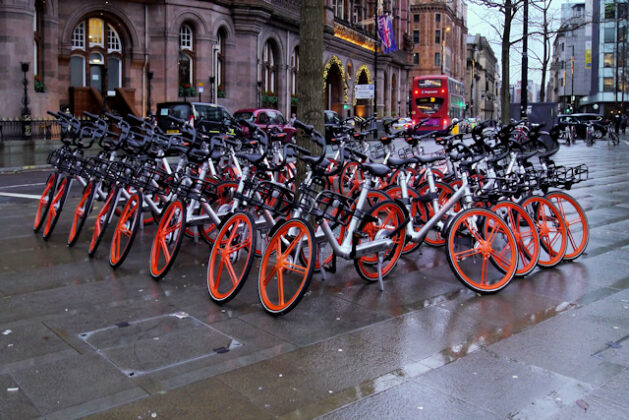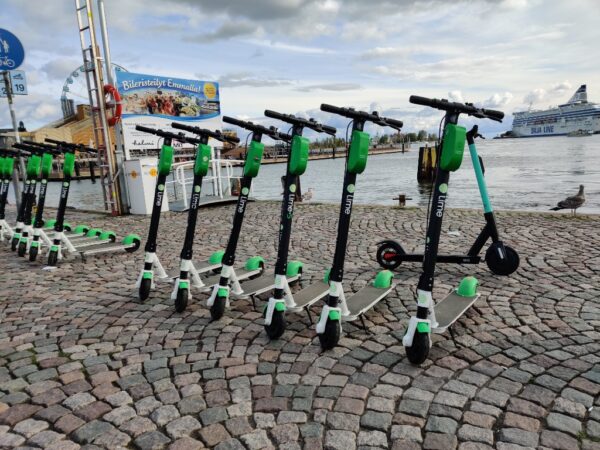Salford e-scooter initiative ‘not another MoBike’
Lime, the company behind an electric scooter trial launching in Salford next week, said that lessons had been learned after the failure of Manchester’s MoBike scheme in 2018.
Starting on Monday, the US-based micro-mobility firm is launching a year-long trial around the University of Salford’s three campuses that will see 300 electric scooters deployed over the course of the next month.
Commentators have expressed doubts about the wisdom of the initiative following the ill-fated MoBike scheme which arrived in Manchester in 2017.
The Chinese firm deployed 2,000 dockless bikes in the city centre, its first European venture, but just 13 months later MoBike pulled out of Manchester following a spate of thefts and vandalism during the summer of 2018 that saw bikes badly damaged and thrown into rivers and canals.
Speaking to Place North West, Florence Milner, general manager of Lime in the UK and Ireland, said she was confident her company’s project would be different, adding that Lime had learned from the MoBike experiment.
“We think this absolutely can work here,” Milner said.
“We are working really closely with Transport for Greater Manchester, the council and the university to understand in advance what challenges there will be and mitigate against them.”
Milner explained that the technology Lime uses is more advanced than MoBike’s was when it launched.
Lime uses more stringent geo-fencing, a mapping process whereby certain areas can be designated as no-go zones, meaning the scooters will power down if a rider veers off course.
This means that riders will not be able to travel on paths directly adjacent to rivers and canals or on pavements.
The geo-fencing software will also ensure that the scooters are parked in designated zones; a rider will not be able to simply abandon them without incurring a charge.
“I rode MoBikes and they weren’t that comfortable. Once you unlocked them you could ride them anywhere. These scooters are very different, they are tracked all the time,” said Andrew Fisher, sustainable transport coordinator at Salford City Council.
“We are confident that Lime is doing everything it can to stop vandalism. This is a very different scheme to MoBike,” he added.
‘This can absolutely work here’ – Florence Milner, general manager for Lime in the UK
The scooters, which will cost £1 to unlock and 15p a minute thereafter, are also fitted with an alarm that will go off if somebody attempts to move one without unlocking it first and, at 30kg apiece, they will not be easy for would-be vandals to pick up, Milner said.
Compared to the MoBike scheme, more care and collaboration has gone into the Salford e-scooter trial, according to a spokesperson for TfGM.
“The partnership [between Lime, TfGM, Salford City Council and the University of Salford] has enabled us to shape the project.
“The phased approach is being taken deliberately so we can manage deployment and quickly react to any issues before we expand further. The experiences of MoBike are embedded into the trial and have been at the front of our thinking,” he said.
Mike Brown, director of strategic partnerships for the university, was clearly proud of being given the opportunity to host the trial.
“E-scooters are used in cities around the world and we are excited to be a key partner. The University of Salford is the only UK university involved in a DfT approved e-scooter trial. We have extensive research experience and leadership in urban studies and mobility with this opportunity putting us at the forefront of the future of mobility,” he said.
While MoBike sets a negative precedent for schemes of this type in the UK – despite continuing to operate in London, Oxford and Cambridge – Milner said the e-scooter trial Lime launched in Milton Keynes recently was going well, with 20,000 users in the first month alone.
“That is around 5,000 car journeys replaced,” she said.
Lime has also had success in London where its e-bikes have been available since November 2018.
“We have not seen high levels of vandalism and we have had great ridership, particularly post- Covid,” Milner said.
E-scooters and e-bikes are common in other European countries. In Germany, Lime operates in 15 cities and the firm was recently selected as one of three operators to deploy 5,000 scooters in Paris.
However, while mainland Europe has welcomed the growing trend for the two-wheeled devices over recent years, the technology has been slower to take off in the UK.
This is due largely to the fact that it is illegal to ride electric scooters on public roads in the UK, unless they are part of an organised trial, but pressure from the Transport Select Committee to legalise their use has been gathering pace in recent months.
A number of trials, like those in Salford and Milton Keynes, have been fast-tracked by the Department for Transport in the wake of the Covid-19 pandemic and the subsequent push for active travel.
Their success could lead to a change in legislation in line with the rest of Europe, which permits the use of e-scooters on roads.
Salford City Council’s willingness to act as a guinea pig for the e-scooter experiment is down largely to a determination to reduce car travel.
Said Fisher: “According to a TfGM report, 60% of journeys under 2km are done by cars and those can be easily walked and cycled. We are trying to encourage a shift away from cars and this is a good alternative.
“We want to be a forward-thinking council that is looking at new ideas and new innovations.”
The creation of Greater Manchester’s Bee Network, an integrated system of walking and cycling infrastructure across the 10 boroughs, makes the city region the ideal place for the trial, according to the TfGM spokesperson.
He added that, while there would no doubt be issues to resolve along the way, data provided by Lime would allow the success of the trial to be measured.
“With the trial we can try to understand how these scooters interact with other road users in a controlled way. We want to understand the conflicts and see how we can address them,” he said.
With the failure of MoBike still fresh in the memory, alongside growing clamour for Greater Manchester to get serious about its zero carbon ambitions, Lime’s Salford venture is under the spotlight, but Milner is not fazed.
“Lime is an experienced operator, we operate in 125 cities in more than 40 countries, and we have come up against different kinds of cities, systems, and built environments. We have the right controls in place to make the scheme work successfully.
“People want a socially distanced and green way to get around. The scooters are really good fun and they allow people to get out of their cars and try a new technology.”








Expect to see lots of dumped scooters around Salford from next week. Have these people not learned from the failed mobikes scheme where we seen hundreds of sliver bikes with orange wheels dumped around Salford and Manchester. Also one of my favourite sayings to my kids is “god gave us legs use them”.
By Darren born bred.
What happens if you have a bridge over a river though? Could still get chucked in
By Disgruntled Goat
@Darren
If god gave you legs then why do you drive around everywhere? Take a piece of your own advice
By Anonymous
I have been surprised by the number of people (young people) using a similar scooter trial in Liverpool. Not totally convinced myself but if it brings a bit of joy and a change of scenery in these gloomy times then why not? It’s outdoor after all.
By Anonymous
I’ve visited a number of cultural cities around the world and seen this provider operating successfully. I do wonder whether they have done their homework on this little challenge mind???? Just saying
By Matt Crimes
The scallies made it a challenge to disrupt the Mobike scheme. Yes that’s a social problem, particular to Manchester/Liverpool, and I don’t know what the solution is. But I think the challenge will still be out there for these scooters too. If they can learn how to immobilise the lock, I assume they can immobilise the alarm too?
By Edge
Some people never learn get ready for the local canals to become a massive parking space .
By Peter
Plus not much of a keep fit scheme
By N
Can’t wait, used these in other countries and will definitely be doing so here!
By Louise
Just make it legal to use your own and sort out lanes for them solves most of the problems typical council/ government wants someone else to foot the bill
By Wayne Pitt